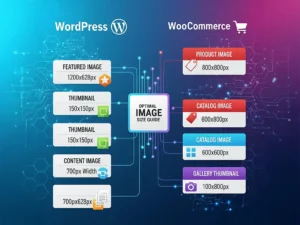Introduction to AI in e-commerce:
Artificial intelligence (AI) is revolutionising the business world, and e-commerce is no exception.
With the power of AI in e-commerce, online shops can optimise their operations, increase sales conversion, offer a personalised and memorable shopping experience to their customers and, consequently, drive growth and success.
But e-commerce isn’t just about online shops and, in this article, we’ll explore 20 AI strategies that you can put into practice not only in your online business but also offline to make the most of this potential.
Take a look at some examples of companies that follow some of the strategies we’ve mentioned and think about what you can do and how you can apply Artificial Intelligence to your business.
You can start with the first one:
1. SEO and content optimisation:
AI can be used to research and select the most relevant keywords for your business, based on search data and audience behaviour.
It can automatically generate optimised meta descriptions for each page of your site, increasing the click-through rate in search results.

It can also create high-quality, informative content, such as blog articles, guides and product descriptions, which attracts the public and improves your site’s positioning in search results.
There’s nothing better than to start talking about AI in e-commerce when it comes to optimising content so that it’s easier to rank first in search engines.
A good example is Amazon, which uses AI in e-commerce to generate personalised product descriptions for each customer, based on their purchase history and searches. This increases the relevance of the content and the likelihood of conversion.
2. Chatbots and Virtual Assistants:

Chatbots and virtual assistants can offer 24/7 support to your customers, answering frequently asked questions, helping with site navigation, and resolving problems quickly and efficiently.
AI in e-commerce can be used to personalise chatbot responses, adapting them to each customer’s needs and preferences.
Sephora, for example, uses chatbots to support customers when choosing beauty products. The chatbot can ask questions about the customer’s skin type, needs and budget to recommend the most suitable products.
3. Personalising the Customer Experience:
AI can analyse customer behaviour on your website and other online channels to create personalised profiles.
Based on these profiles, AI can recommend relevant products, offer personalised promotions and send targeted emails with content that interests each customer.
Netflix uses AI to recommend films and series to its users. The recommendations are based on the user’s viewing history, ratings, and searches.
4. Order forecasting and stock management:
AI can analyse historical sales data, seasonality and market trends to forecast orders for your products.
Based on these forecasts, it can optimise your stock management, avoiding product shortages and excess stock-outs.
You can hire e-fulfilment companies that already have these services based on Artificial Intelligence
As an example, Walmart uses AI to predict product orders in each of its shops. This allows the company to optimise stock and ensure that the right products are available at the right time.
5. Sentiment Analysis and Online Reputation:
Sentiment and online reputation are closely linked. Your online reputation is the image you build on the Internet, based on what people say about you.

AI can monitor social media and other online channels to identify customer sentiment towards your brand, products, and services.
This information can be used to improve your online reputation, proactively solve problems and identify opportunities for improvement.
Nike uses AI to monitor social media and identify mentions of its brand. The company uses this information to interact with customers, answer questions and solve problems.
6. Segmentation and Targeted Marketing:
AI can segment your audience based on demographics, interests, purchasing behaviour and other relevant factors.
Based on segmentation, it can create more targeted and effective marketing campaigns, increasing return on investment (ROI).
Facebook uses AI to target its users and show personalised ads. The ads are based on users’ demographics, interests, and online behaviour. That is one more strategy using AI in e-commerce.
7. Automation of Repetitive Tasks:
AI can automate repetitive tasks such as customer service, order management, sending emails and other administrative activities.
This frees up time for your team to focus on strategic activities that generate more value for your business.
Amazon, for example, uses AI to automate the customer service process. Artificial Inteligence can answer frequently asked questions, solve simple problems and even process product returns. All this frees up time for customer service employees to focus on more complex problems and offer a better customer experience.
8. Fraud detection and security:

AI can be used to detect and prevent fraud in online transactions, protecting your business and your customers.
It can also be used to monitor the security of your website and protect your data against cyber-attacks.
PayPal uses AI to detect fraud in online transactions. AI analyses customer behaviour and other factors to identify transactions that may be fraudulent.
9. Price Optimisation:
You can analyse market data, sales history and consumer behaviour to define the ideal prices for your products. This is one of the applications of AI in e-commerce.
It ensures that you can offer the best prices to your customers while maximising your profits.
One company that uses this AI capability to set prices for its services is Uber. AI analyses requests for a ride, the customer’s location, and other factors to set the ideal price for each journey.
10. Development of new products and services:
AI can be used to identify new market opportunities and develop innovative products and services that meet your customers’ needs.
AI can also be used to optimise the product development process and reduce the time to market for new products.
Then there’s Netflix, which uses AI to identify new ideas for series and films. AI analyses user behaviour and market trends to identify which types of content are most likely to be successful.
11. Automatic Translation:
AI can automatically translate your website content into different languages, extending your global reach and reaching a wider audience.
Google Translate uses AI to translate texts from one language to another. The tool is free and easy to use, and allows you to translate texts quickly and ever more accurately.
12. Image and video generation:
Now let’s talk about images and videos. With AI you can generate personalised images and videos for your website and marketing campaigns, increasing customer interest and improving business aesthetics.

Perhaps this is the use of artificial intelligence that is best known to the general public, and it can be understood as being used more for leisure and entertainment.
However, it is a facilitating tool in marketing in general, and is also used by image bank companies.
Shutterstock uses AI to generate personalised images for its customers. The tool allows customers to create images based on their needs and preferences.
13. Augmented Reality and Virtual Reality:
AI can be used to create augmented reality and virtual reality experiences that interact with customers and offer a more immersive shopping experience.
When you buy glasses online, you can visualise, as if in a mirror, how they look on you and easily decide to buy without going to the shop. This is a good AI in e-commerce strategy.
We can also give the example of IKEA, which uses augmented reality to allow customers to visualise how their furniture might look in their homes. The IKEA app allows customers to point their smartphone camera at a space in their home and see how a specific piece of furniture might look in that space.
14. Data Analysis and Business Intelligence:
AI can analyse large volumes of data to identify valuable insights about your customers, market and business.
These insights can be used to make smarter decisions and improve the performance of your business.
Amazon is always a good example, and in this case it uses AI to analyse its customer data. It then uses this information to improve the customer experience, personalise products and services and make strategic decisions.
15. Robotic Process Automation:

AI can be used to automate repetitive, manual tasks such as entering data, sending emails and other administrative activities.
This frees up time for teams to focus on strategic activities that generate more value for your business.
The accounting firm EY uses AI to automate its auditing processes. AI can analyse large volumes of financial data and identify anomalies that may indicate fraud or errors. This allows auditors to focus on more complex and strategic tasks.
16. Predictive maintenance:
AI can also be used to predict failures in equipment and systems, making it possible to carry out preventive maintenance and avoid downtime.
This ensures that the entire operation can run smoothly and also maximises its productivity.
Let’s talk about aeroplanes and the aviation company Boeing, which uses AI to predict faults in its aircraft. AI analyses flight data such as altitude, speed and temperature to identify potential problems before they cause failures.
17. Risk management:
AI can be used to identify and assess risks that could affect your business, such as fraud, cyber-attacks and market fluctuations.
This allows you to mitigate these risks and protect your business.
Insurance and banking companies are perhaps two types of businesses that can benefit most from AI for risk management. Insurance company AXA uses AI to assess its customers’ credit risk. AI analyses financial data and customers’ credit histories to determine default risks.
18. Supply Chain Optimisation:
AI can be used to optimise the supply chain, reducing costs, and improving efficiency.
AI can analyse supplier, stock, and transport data to identify opportunities for optimisation.
Walmart uses AI to optimise its supply chain. AI analyses sales, stock, and transport data to determine the ideal quantity of products to be stored in each shop and what the procurement times should be.
19. Sustainability:
AI can also be used to reduce the environmental impact of your business by optimising the use of resources and energy.
It can analyse energy consumption data, carbon emissions and other factors to identify opportunities for reducing environmental impact.

Energy companies such as Enel use AI to optimise energy consumption in their networks. AI analyses energy consumption data and weather conditions to adjust energy production in real-time.
20. Continuous Innovation:
AI can be used to identify new opportunities for innovation in all aspects of your business.
It analyses customer, market, and technology data to identify new ideas and solutions.
Technology company Google uses AI to develop new products and services. AI analyses search data, user behaviour and market trends to identify new opportunities for innovation.
Conclusion:
Artificial intelligence is transforming the business world, and e-commerce is no exception. With the power of AI, you can optimise your operations, increase sales conversion, offer a personalised and memorable shopping experience to your customers and, as a result, drive growth and achieve success.
We hope you’ve enjoyed learning about the 20 strategies we’ve suggested and that they’ve been useful to you in boosting your business.
If you have any questions, please get in touch.







